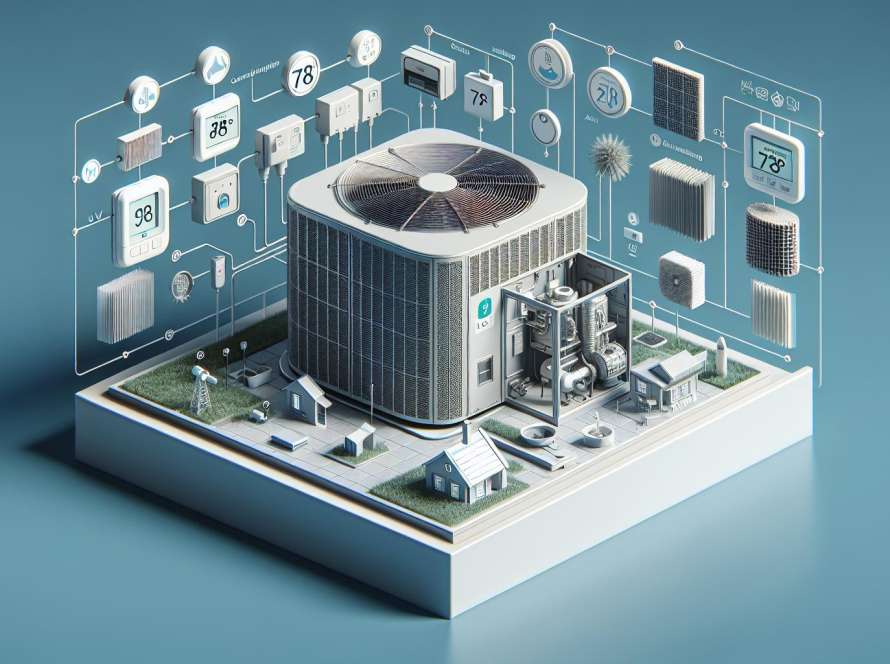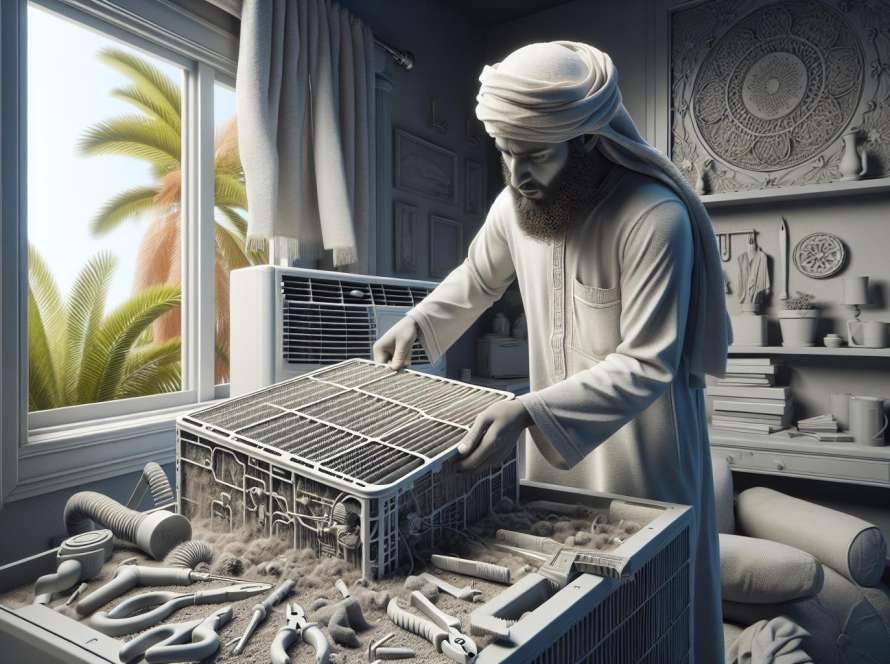So, you’re in Florida, where the heat and humidity can be relentless, and your AC decides to act up. We’ve all been there – sweating it out while trying to figure out what’s wrong with our cooling system. But fear not, because in this guide, we’ve got you covered with efficient AC troubleshooting tips specifically tailored to tackle the challenges of the Florida climate.
From sudden breakdowns to uneven cooling, Florida’s weather can really put your AC to the test. That’s why it’s crucial to have a solid understanding of common AC issues and how to address them promptly. In this article, we’ll walk you through step-by-step solutions to keep your AC running smoothly and your indoor environment comfortable, even in the sweltering Florida heat.
Don’t let a malfunctioning AC ruin your day – with our expert advice, you’ll be equipped to troubleshoot like a pro and ensure your cooling system stays in top shape, no matter what the Florida climate throws your way.
Common AC Issues in Florida Climate
Living in Florida comes with its unique set of challenges for air conditioning systems. It’s important to be aware of the most common AC issues that can arise in this hot and humid climate. Here’s a breakdown of what to look out for based on different experience levels:
For Beginners: Understanding Basic AC Problems
- Clogged Air Filters: One of the most common issues in Florida is dirty air filters causing reduced airflow.
- Refrigerant Leaks: Loss of refrigerant due to leaks can lead to inefficient cooling.
- Thermostat Issues: Incorrect thermostat settings can result in uneven cooling and higher energy bills.
For Intermediate Users: Troubleshooting Methods
- Condensate Drain Blockage: Check for clogs in the condensate drain line, a common cause of water leaks.
- Electrical Control Failure: Keep an eye out for wiring issues that can affect the functioning of the AC unit.
- Frozen Evaporator Coils: Low refrigerant levels or restricted airflow can cause the coils to freeze.
- Compressor Failure: The compressor is a crucial component that may fail due to overheating or electrical issues.
- Ductwork Problems: Leaks or poor insulation in the ductwork can lead to inefficiencies.
- Sensor Malfunction: Faulty sensors can disrupt the AC system’s ability to regulate temperature accurately.
Being proactive in identifying and addressing these common AC issues can help maintain the performance and longevity of your air conditioning system in the Florida climate. Regular maintenance checks and timely repairs are key to ensuring your AC unit functions efficiently, even in the face of the Sunshine State’s heat and humidity.
Signs of AC Troubles to Watch Out For

In Florida’s hot and humid climate, it’s crucial to be aware of the warning signs that your AC unit might be experiencing issues. Whether you’re a beginner or an expert in AC maintenance, keeping an eye out for these indicators can help you address problems before they escalate. Here are some common signs to watch out for:
For Beginners: Recognizing Basic Red Flags
- Weak Airflow: If your AC is struggling to cool your space effectively, it could indicate issues with the compressor or ductwork.
- Unusual Noises: Pay attention to any clanking, grinding, or squealing sounds, as they could signal problems with the fan or motor.
- Frequent Cycling: If your AC turns on and off frequently, it might be a sign of an underlying issue, such as a faulty thermostat.
- Visible Leaks: Puddles of water or refrigerant around your unit can indicate leaks that need immediate attention.
- Strange Odors: Foul smells coming from your vents could be a sign of mold or electrical problems.
For Intermediate Users: Digging Deeper into Troubleshooting
- Inconsistent Temperatures: If certain rooms are cooler or warmer than others, there may be issues with your ductwork or the size of your AC unit.
- High Humidity Levels: Excess humidity in your home could point to a problem with your AC’s dehumidification process.
- Ice Build-Up: Frost or ice on your AC unit could be a sign of restricted airflow or low refrigerant levels.
- Tripped Circuit Breakers: If your AC keeps tripping the circuit breaker, it could be due to electrical issues within the unit.
- Refrigerant Leaks: Addressing refrigerant leaks requires a professional to locate the source, repair the leak, and recharge the system.
- Evaporator Coil Cleaning: Regular cleaning of the evaporator coils can prevent issues like frozen coils and inefficient cooling.
- Electrical Component Inspection: Checking and replacing faulty electrical components can prevent system failures and ensure safe operation.
- Ductwork Assessment: Inspecting and sealing ductwork can improve airflow and energy efficiency in your AC system.
Stay vigilant and proactive in monitoring these signs to maintain optimal performance and longevity of your AC system in the Florida climate.
DIY AC Troubleshooting Tips
For Beginners: Mastering the Basics
- Check Air Filters: Ensure they are clean and replace if dirty.
- Adjust Thermostat Settings: Set it to cool and lower the temperature.
- Inspect Circuit Breakers: Look for tripped breakers and reset if needed.
- Clear Debris: Remove any obstructions around the outdoor unit.
- Check Vents: Ensure they are open and unblocked for proper airflow.
For Intermediate Users: Enhancing Your Skills
- Inspect Refrigerant Levels: Look for signs of leaks and call a professional if needed.
- Clean Evaporator Coils: Use a soft brush to remove dust and debris.
- Examine Ductwork: Look for leaks or blockages that may affect airflow.
- Test Capacitors: Check for bulging or leaking capacitors that may need replacement.
- Verify Thermostat Accuracy: Use a separate thermometer to ensure accurate readings.
- Inspect Fan Blades: Look for wear or damage that may affect airflow.
- Measure Voltage: Test electrical components for proper voltage supply.
- Check Condensate Drain: Ensure it’s clear to prevent water leaks.
- Perform System Load Calculation: Evaluate the system’s cooling capacity for efficiency.
- Consider Upgrade Options: Assess if upgrading to a more energy-efficient unit is beneficial.
| DIY AC Troubleshooting Tips |
|---|
| Beginners: |
| Air Filters: |
| Thermostat: |
| Circuit Breakers: |
| Debris: |
| Vents: |
| Intermediate: |
| Refrigerant Levels: |
| Evaporator Coils: |
| Ductwork: |
| Capacitors: |
| Thermostat: |
| Experts: |
| Fan Blades: |
| **Voltage |
Professional AC Maintenance Services in Florida
When it comes to Professional AC Maintenance Services in Florida, it’s essential to entrust your system to skilled technicians for optimal performance in the hot and humid climate. Here are tailored recommendations based on different user experience levels:
For Beginners: Basic Maintenance Checks
- Schedule routine maintenance: Contact a licensed HVAC technician to perform regular inspections.
- Change air filters: Swap out filters every 1-3 months to ensure proper airflow.
- Clear debris: Keep the outdoor unit area free from obstructions like leaves and branches.
- Check thermostat settings: Ensure the thermostat is set correctly for comfort and efficiency.
For Intermediate Users: Detailed Inspections and Cleaning
- Inspect ductwork: Look for leaks or blockages that may impede airflow.
- Clean evaporator coils: Remove dirt and debris to maintain efficiency.
- Test capacitors: Check for signs of wear and tear that could affect performance.
- Inspect fan blades: Ensure blades are clean and balanced for smooth operation.
- Verify thermostat accuracy: Calibrate the thermostat to ensure accurate temperature readings.
- Measure voltage: Test electrical connections for optimal power supply.
- Perform load calculation: Determine the system’s cooling needs for efficiency.
- Check condensate drain: Clear any clogs that could lead to water damage.
- Consider upgrades: Evaluate energy-efficient options to reduce utility costs.
- Verify refrigerant levels: Ensure the refrigerant is at the correct level for cooling.
By following these tailored recommendations at different expertise levels, you can ensure your AC system operates efficiently and effectively in Florida’s challenging climate.
Conclusion
In Florida’s hot and humid climate, efficient AC troubleshooting is essential for optimal performance. Professional maintenance services play a crucial role in ensuring the longevity of your system. By following tailored recommendations based on your expertise level, you can maintain your AC unit effectively. From basic checks like changing air filters and clearing debris to more advanced tasks such as inspecting ductwork and testing capacitors, each step contributes to the overall efficiency of your system. By staying proactive and addressing issues promptly, you can enjoy a comfortable indoor environment year-round. Remember, a well-maintained AC system not only enhances performance but also helps you save on energy costs in the long run. Trusting experts for regular maintenance will keep your AC running smoothly in Florida’s demanding climate.

